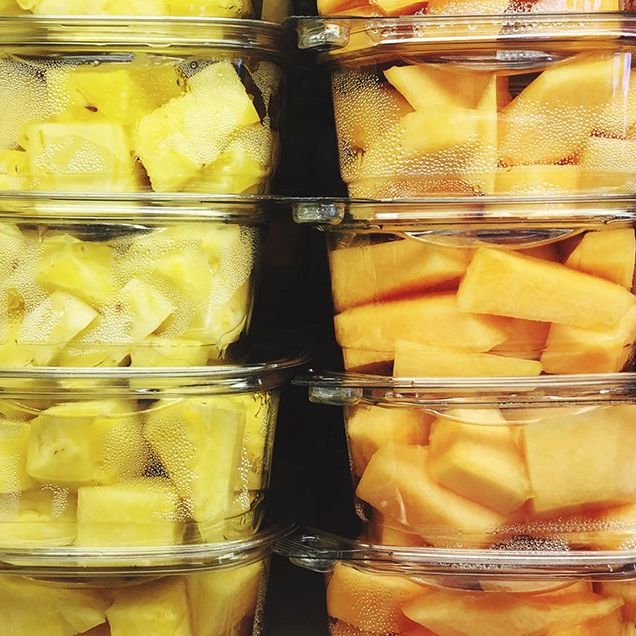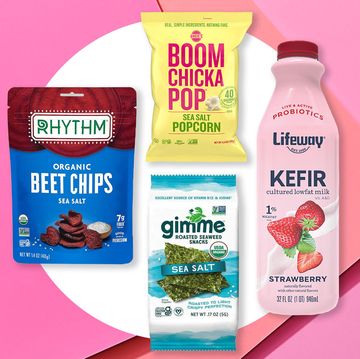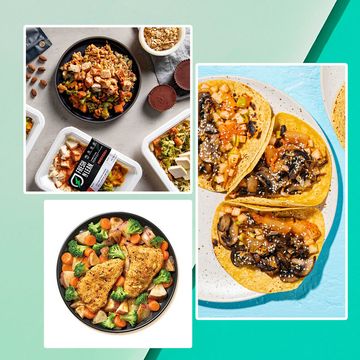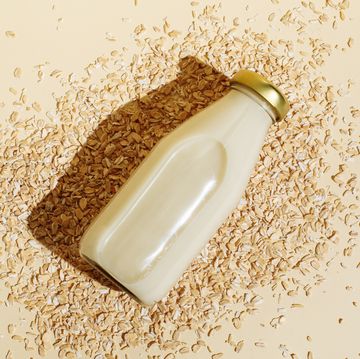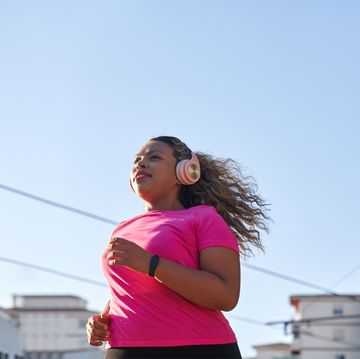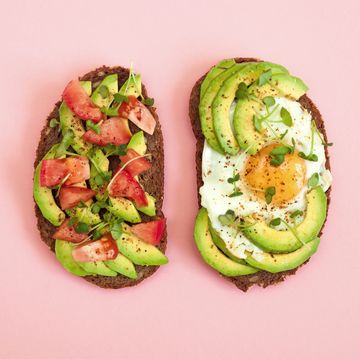Props for swapping that plastic water bottle for a reusable one… and your cleaning products for simple vinegar and baking soda… and store-bought herbs for the ones on your windowsill. See, trading up doesn't always have to cost you more money—and grocery shopping is no different.
We combed the aisles and crunched some numbers to find these six simple food swaps that come with cost savings, nutritional benefits, and sometimes way fewer calories. Some even involve switching to organic. Yep, these are total upgrades.
Swap #1: Pita chips for bell pepper strips
Sure, hummus is healthy, but what you pair it with can make a big difference to your wallet and waistline. Take pita chips: They brag about being baked, but just 10 chips give you 130 calories and 5 grams fat. Swap the empty calories for bell pepper strips, and you've got a healthier, fat-free cruncher. One cup of pepper strips spares you 100 calories and gains you a hefty dose of vitamin C.
"Crunchy raw veggies give the crisp of a chip, but also provide vitamins and filling fiber to satisfy you more quickly," says Elana Natker, MS, RD, a registered dietitian from Washington D.C. As for price, a bag of pita chips typically sells for more than $3, while an entire bell pepper can go for as low as $1 at stores like Trader Joe's. (Try pairing your upgraded snack with these ridiculously tasty hummus recipes.)
Cash saved per swap: $2
*Cash saved per month: $8
*Calculation based on buying this food and making this swap each week for a month
Related: 6 Summer Veggies You Didn't Know You Could Add To Smoothies
Swap #2: Granola for oatmeal
That granola in the cereal section may look wholesome with the promise of "whole grains" and "fiber" printed right on the box, but check out the small print and you'll find sugar listed as the second ingredient. No wonder a ½-cup serving can have 240 calories and 14 grams sugar, not to mention 7 grams fat. Compare that to a 1-cup cooked serving of old-fashioned oats (150 calories, 1 gram sugar) and you get double the portion for a fraction of the calories—and 3 teaspoons less sugar!
"Oats are one of the major heart-healthy foods, but you may be diluting their benefits by getting them from granolas instead of a minimally-processed bowl of oatmeal," warns Tamara Duker Freuman, MS, RD, a registered dietitian in New York. Granola should be considered a treat food, not a breakfast staple, she says. (Making steel-cut oats in your slow cooker will make this swap easier than ever.) On the cash front, old-fashioned oats at Whole Foods go for about 40 cents less per serving than a standard box of granola.
Cash saved per swap: $3.20
*Cash saved per month: $13
Make your smoothies way more filling with this simple swap:
Swap #3: Baby carrots for rainbow organic carrots
Baby carrots may be cute and convenient, but they're not "baby" carrots at all (real carrots have a tapered end). Not that we're knocking baby carrots: They're an easy way to eat more vegetables and get your beta-carotene, but there is a price tag for the time you save chopping: One pound of baby carrots at Trader Joe's rings in at $1.29, while a 2-pound bag of whole organic rainbow carrots is more like $1. Yes, more and organic for less!
Picking carrots pulled from the ground—versus the cut, shaped, and washed versions from a factory—means you're skipping the chlorine bath standard for baby carrots (it's done to cut down on bacteria that cause food-borne illness). Plus, going organic means less pesticide residue and more disease-fighting antioxidants—up to 60% more, according to one study. Best of all, you get a rainbow of plant pigments from eating not just orange carrots, but also purple, yellow, red, and white. "Each color provides slightly different phytonutrients, so you get a slight nutrition advantage that way," says Natker. (Check out the nutrients that could help you crush diabetes.)
Cash saved per swap: 30 cents
*Cash saved per month: $1.50
Related: Make This 15-Minute All-Organic Meal For Under $15
Swap #4: Bagged popcorn for air-popped kernels
Normally packaged products get a thumb's down for being overly processed and nutritionally void. Not bagged popcorn—as long as you buy plain and not overly buttery, of course. The whole grain, antioxidant-packed snack contains appetite-suppressing fiber and only 65 calories per cup. Not bad, but air-popped kernels are even better. At only 30 calories per cup, you can eat twice as much for the same amount of calories but a fraction of the cost (about 65 cents less per serving). "You can also control the amount of added salt when you pop your own, which is a bonus for people watching their blood pressure," adds Freuman. (Try these 15 creative twists to your homemade popcorn.)
Cash saved per swap: $3.25
*Cash saved per month: $13
Swap #5: Pre-cut produce for whole produce
Buying those bright containers of mixed tropical fruit, cubed butternut squash, and bagged lettuce can mean less prep time and less food waste, but the convenience comes at a steep price. Pre-cut chunks of pineapple, for example, can cost as much as eight times more as buying the whole fruit (and cutting it's not that hard; here's the right way to do it). Whole produce is also fresher and more flavorful, and a study published in the British Food Journal even found that it packs more vitamin C than pre-cut produce.
What's more, you could be losing some of the most nutritious parts of the plant: "Opt for the whole broccoli instead of pre-cut florets and those stalks can make a quick and nutritious broccoli soup," says Freuman, "or whole butternut squash instead of the pre-cut chunks and you can roast the seeds with olive oil and salt, and enjoy them as a nutritionally-dense snack." (Speed up your progress towards your weight-loss goals with Women's Health's Look Better Naked DVD.)
Cash saved per swap: $1 to 8 (depending on the produce)
*Cash saved per month: Up to $20
Swap #6: Brown eggs for white eggs
Brown eggs can cost more than double that of white eggs, so they must be better for you, right? Wrong. Truth is, the color of the shell doesn't elevate the flavor or nutritional profile (both are around 70 calories and 6 grams of protein), it just tells you what kind of chicken laid it—and the breed of hen that lays brown eggs requires more feed. "Nutritionally, they're equivalent, so it's ludicrous to pay a premium for one color over another," says Freuman.
That said, since the quality of a hen's diet directly affects the nutritional quality of her eggs, free-range or pasture-raised eggs are worth the premium. "They will likely have significantly more vitamin E, vitamin A, and heart-healthy omega-3 fats compared to standard conventionally raised or even organic eggs," adds Freuman. At Trader Joe's, a dozen large white eggs sells for $1.19, while a dozen large brown eggs goes for $2.79. That's 9 cents per egg versus 23 cents per egg. (Don't let any part of the egg go to waste! Here's why you should eat the whole egg.)
Cash saved per swap: $1.60
*Cash saved per month: $6.40The article 6 Simple Grocery Swaps You Should Make To Lose Weight—And Save $60 Per Month originally appeared on Prevention.
